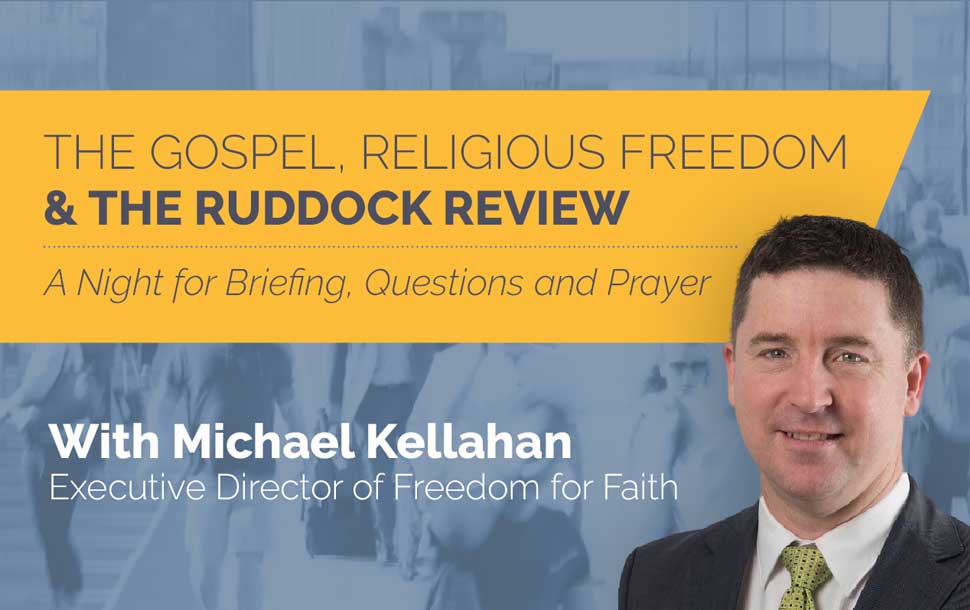Speaking openly about Jesus can sometimes feels hard or even dangerous. How can we speak with boldness, love and wisdom? How can we help our friends, work colleagues and family hear the gospel well? And how can we help preserve the freedom to speak about Jesus in our country? Visit our NEW Speaking Freely about Jesus Resources page for some great ideas.

GiST Stories: Living for Jesus in the Corporate Workplace
Changing cultural views on the nature of diversity, love and tolerance have created both opportunities and challenges for Christians in the corporate workplace. We spoke to Andrew*, a PCQ church member, about his experiences. (* not his real name)

Speaking Well of Jesus
‘Giving an answer’ for our hope in Christ is one of our greatest privileges and hardest tasks. There is nothing anyone we know needs more than to know Jesus and the forgiveness he offers. But it remains one of the most difficult things we do in our everyday lives. Which words are the wisest? When to speak, when to be silent, when to ask questions? How to love well? Read on for some good ideas.
Living for Jesus in the ‘new Australia’
Last year’s ‘YES’ vote and the subsequent passing of legislation allowing same-sex couples to marry in Australia, will have raised all sorts of questions for each of us. Has our society now completely shifted away from ‘Christian values’ and does this even matter? Is religious freedom under threat? What will the consequences be for our children?The Gospel, Religious Freedom and the Ruddock Report

On November 15th, GiST and City Bible Forum Brisbane hosted a discussion on religious freedom and the Ruddock Report with Michael Kellahan from Freedom for Faith. Listen to the recording and read the report here…
The Gospel, Religious Freedom & the Ruddock Report
The Gospel, Religious Freedom & the Ruddock Report: Highlights from the recent GiST Event
Rohan Pieris
We live in a society where our freedom as Christians to publicly live out our faith feels increasingly under pressure. Whether it’s in the office, at our place of study, or amongst unbelieving friends and family, we’re living in a cultural moment where it not only feels weird and out of place to speak of Jesus, but we worry that it may even provoke outright hostility. Of course, it’s nothing new for Christians to find themselves out of favour, or even hated, and we need to remember that whatever we might be going through is minimal compared with the intense suffering of brothers and sisters around the world in the persecuted church. Nevertheless, it’s appropriate to acknowledge the rapidly changing landscape for religious freedom here in Australia so that we might be well informed and prayerful about the challenges and opportunities it presents for us as Christians. It was this background that prompted our PCQ Gospel in Society Today (GiST) team to invite Michael Kellahan (Executive Director, Freedom for Faith) to speak in Brisbane on Thursday 15th November on the topic: “The Gospel, Religious Freedom and the Ruddock Report”. The event was held in partnership with City Bible Forum and Freedom for Faith, a Christian legal think tank that exists to see religious freedom promoted and protected in Australia. Approximately 50 people attended, coming from Presbyterian churches and a range of other Christian denominations and organisations. We opened the night with a reading from Acts 4:1-31, where right from the beginning of Christianity, Peter and John found themselves under pressure from authorities who sought to restrict their religious freedom. However, empowered by the Holy Spirit and trusting in their sovereign Lord, these early evangelists continue to speak boldly about Jesus, whatever the consequences. They understand that their allegiance to the risen Christ must always be higher than what they owe the state, and they refuse to allow fear to silence them. While our situation is quite different to what Peter and John faced, Michael helpfully encouraged us to see them as a model for our response to any pressures we face in living as Christians in 21st century secular Australia. Trusting in God, we need not be fearful, we must continue speaking about the hope we find in Jesus, and we should devote ourselves to prayer as our commitment to Christ is increasingly put to the test. With those key foundations in place we moved onto considering the current legal framework for religious freedom. Exactly one year prior to our event, the results of the same-sex marriage plebiscite were announced and the Federal Parliament subsequently legislated to introduce same-sex unions. In response to concerns about the impact marriage law changes may have on Australians with faith, the government established a broad-reaching enquiry led by former Attorney-General, Philip Ruddock, “to examine whether Australian law adequately protects the human right to freedom of religion”. Over 16,000 submissions were received, including one from the GiST team, outlining our gospel framework and endorsing the lengthy submission from Freedom for Faith. The final report from the Ruddock enquiry was finalised some months ago, but unfortunately neither its contents nor the government response had been released by the time of our event. Nevertheless, Michael spoke of how the enquiry and subsequent discussions with politicians regarding public policy have provided Christians with a unique opportunity to shape the future landscape of religious freedom in this country. As the report is released and religious freedom is part of the public conversation, we were urged to advocate for a society in which people are free to live out their religious convictions, side by side with others who may disagree, without interference from government. In speaking with unbelievers, and even our local political representatives about these issues, it’s important that we’re aware of the two major perspectives on religious freedom that were represented in submissions to the Ruddock Enquiry: Firstly, those who believe religious freedom is not under threat because they understand faith mainly in terms of privately held beliefs about God and the ability to gather with other like-minded people for worship services. Our current laws are adequate to protect these freedoms, and many suggested that religious groups actually enjoy too many concessions at the moment. Some were prepared to concede freedom to ministers of religion and churches not to conduct same-sex weddings. But otherwise there should be “no exemptions to equality”, since those who adopted this view of religious freedom saw any attempts to further expand legal protections as nothing more than a cover for bigotry. Michael noted that despite the impression we might get from media coverage, this group was smaller than expected. Secondly, those who understand faith as having broad-reaching implications for a believer’s life saw that religious freedom should extend beyond personal beliefs and the ability to gather for corporate worship. It must be lived out publicly, in community with others. On that measure, the current laws are inadequate in protecting the rights of religious Australians to meaningfully contribute towards society on the basis of their religious convictions, especially as they face increasing pressure to exclude their beliefs from the public sphere. On marriage and a range of other issues, there were specific concerns raised about free speech, parents’ rights, charities, workplaces and the independence of religious schools from the state in determining their beliefs, policies and practices. Christians who see that following Jesus requires an all-of-life commitment would understand their faith in this second way. We participate in the wider community and seek the common good in obedience to Jesus’ command to love our neighbour. There is a rich history of our positive contribution to Western society on that basis, which must not be forgotten. Consequently, Freedom for Faith has advocated for religious freedom to be protected as a positive legislative right, instead of the current exemptions-based approach, which gives the impression we want special treatment to practice discrimination and avoid playing by the same rules as everyone else. In contending for this kind of additional protection, Michael reminded us to listen well to those with whom we disagree, and particularly their genuine concern for equality and justice for all. We ourselves show a commitment to these values when we are just as willing to speak up for the religious freedom of people from other faiths with whom we disagree, as we are for our own. To do this demonstrates we are driven by a pursuit of the common good, rather than simply self-interest, because we genuinely believe a free society to live out one’s faith is the best outcome for our nation. So, we should make the most of the opportunity afforded by the Ruddock enquiry to be involved in shaping the religious freedom landscape which will exist here for years to come. However, that experience of the early Apostles teaches us that our faith in Jesus is in no way dependent on the level of protection granted by the government for religious freedom. For our ongoing witness to be effective, we must not allow ourselves to be crippled by fear, and instead continue to live and speak boldly for Jesus, no matter the consequences. A real highlight of the evening was praying together for our nation, giving thanks for the relative freedoms we’ve enjoyed for so long here in Australia, and praying we would remain steadfast in our commitment to Christ, whatever the future holds. Another great encouragement was an interview with Matt Duncan from Moorooka Presbyterian Church. Matt spoke about some of the challenges and yet wonderful gospel opportunities he’s experienced in seeking to live and speak as a disciple of Jesus in today’s corporate workplace. Overall, this was an informative and uplifting event where above all else, we were reminded that trust in our sovereign Lord Jesus, rather than fear, is the best Christian response to any current and future developments concerning religious freedom. “But even if you should suffer for what is right, you are blessed. “Do not fear their threats; do not be frightened.” But in your hearts revere Christ as Lord. Always be prepared to give an answer to everyone who asks you to give the reason for the hope that you have. But do this with gentleness and respect, keeping a clear conscience, so that those who speak maliciously against your good behaviour in Christ may be ashamed of their slander.” (1 Peter 3:14-16)Need Ideas for Prayer? Read our Prayers from the Night
Submissions Regarding the draft Religious Discrimination Bill 2019
How can we speak about to our community about the recent draft Religious Discrimination Bill? What can we say to our local MPs and policy makers? How can we argue for religious freedom while also pointing to the gospel? See these PCQ and PCA submissions for ideas.
Submission on behalf of The Presbyterian Church of Queensland to the Commonwealth Attorney General regarding Religious Discrimination Bill 2019
Submission of The Presbyterian Church of Australia on the draft Religious Discrimination Bill 2019
The Presbyterian Church in Australia (PCA) welcomes the opportunity to make a submission about the draft Religious Discrimination Bill.
Who we are
The Presbyterian Church in Australia (PCA) consists of over 500 congregations meeting throughout all Australian States and Territories. It is a community of about 30,000 people, with congregations from at least nine different non-English speaking cultures. Beyond its congregational ministries, the PCA operates schools, aged care facilities and pre-schools, and provides social services and chaplaincy care in a wide range of communities throughout the nation. The Presbyterian Church has been part of Australian society since 1803 and formed as the PCA in 1901. It consists of six churches, in each State (with the the ACT as part of the Presbyterian Church of NSW and the Norther Territory part of the Presbyterian Church of Queensland). The six state churches are united in a federal arrangement. As such, some of the State churches have made their own submission on the Bill.
Endorsed submissions
In making our submission, we endorse submissions by:
- The Presbyterian Church of Victoria
- The Presbyterian Church of QueenslandFreedom for Faith
- Anglican Church Diocese of Sydney.
Our convictions
The Presbyterian Church is concerned that religious freedom be protected as fully as possible in our nation. Human beings are fundamentally religious and it is in their nature to seek the sense of wonder, mystery and meaning which comes from religion. Although, God has the proper claim on the worship of all people, he allows them freedom to seek and find him. Religious convictions and practices are thus an important part of culture for millions around the world and here in Australia. Allowing individuals and communities the freedom to express their religious convictions as fully as possible is an important way of treating them with dignity.
Religious believers make a major contribution to the common good of our society, and it is to the benefit of the whole society that believers are able to give wide expression of their faith in word and action (recognising that religion should offer no protection to acts to acts of violence or abuse).
Since its formation the PCA has been committed to freedom of religion. This is expressed in the Declaratory Statement adopted by the Church on its formation on July 24, 1901 wherein it states that the Church “disclaims …intolerant or persecuting principles” and upholds “the liberty of conscience and the right of private judgment”. This statement is an assertion of the Church’s support of freedom of religion in Australia.
The PCA, along with other Christian churches, is a body of believers who are committed to a corporate, public and therefore institutional expression of our religious faith. The primary expression of this is in our congregations, though it extends to a range of other organisations which express the mission of the church. Freedom of religion requires churches and Christians to be able to co-operate in operating a range of institutional expressions of their faith.
As Presbyterians in the protestant tradition, we understand each individual Christian to be a member of what Martin Luther called ‘the priesthood of all believers’. This understanding leads us to say that every Christian has a sacred duty to live and pursue their work from Christian convictions. The book of James, in the New Testament, teaches that faith that is not expressed in deeds is, in fact, ‘dead’. Christianity is not simply a private matter that can be left at the door of the home, or of the church, but a view of the world that shapes public life. Thus, there is in Presbyterian thought no clear sacred/secular
divide. Every Christian — whether a cobbler, baker, or politician — should see their work informed by their faith. This view of religion stands in contrast to that presupposed in any claim that protection of religious freedoms is only necessary for clergy or churches determining.
The PCA holds that freedom of religion must be extended to people of all religions, and that equivalent freedoms should be granted to those who hold no religious convictions. We are concerned that attempts to protect freedom of religion by codification may prove counter-productive and urge the
Government to allow maximal freedom with minimal regulation.
Our concerns
We raise the following concerns about the exposure draft.
1) It is not clear Clause 10 (1) will allow religious organisations which do not require employees to share their religious convictions to prefer employees who share those convictions.
This may inhibit the ministry of our schools, pre-schools, aged care facilities and hospitals. In many of those institutions the need to employ suitably qualified staff means that it has not been possible to have a policy in which all staff as required to have a Christian faith. Nevertheless, it is essential for the institutions to be able to prefer such staff, if they are to achieve their mission.
2) The definition of religious bodies in Clause 10(2) seems to exclude schools, pre-schools, aged care facilities and hospitals, all of which we consider to be expressions of our ministry in Christ’s name.
The Presbyterian Church runs several such institutions in various states. In order for these institutions to be sustainable, they have a commercial aspect to their work. That does not exclude them from being legitimate expressions of the mission of the church.
As argued in the submission by the Anglican Church Diocese of Sydney, there is no reason why an organisation which receives payment for goods or services cannot have a religious purpose. Such a commercial activities test should be removed from the Bill.
3) It is not clear that the legislation would protect good faith expressions of moral teaching (such as on matters of sexuality, gender and marriage) which some might claim to be “vilification”, since Clause 41(2) does not define vilification. The Bill would be improved by having this term removed. The provisions to prohibit expression which “harass or incite hatred or violence” would sufficiently cover the necessary ground without risking unintended consequences.
Both in Australia and in other jurisdictions we have seen cases of complaints made against Christians for legitimate expression of Christian moral teaching. A case in point is that of a minister Campbell Markham and pastoral worker Andrew Gee in the Presbyterian Church of Tasmania who have faced action under the Anti-Discrimination Act (1998) in relation to blog posts and public preaching. Each incident involved expressions of traditional Christian sexual morality. While the complaint was eventually dropped, it is not clear what the outcome would have been if the complaint had been continued. It should not be necessary for people to defend legitimate expressions of religious views before tribunals, not should they have to face the significant cost of doing so. The Federal Legislation should ensure that similar complaints will not be entertained.
4) The provision in Clause 8(3) for employers to limit expression of opinion by employees on the basis of “unjustifiable financial hardship to the employer” opens the way for powerful commercial interests to censor reasonable private expressions.
The case of Israel Folau is only too well known. We are more concerned about the possible impact on employees with far less profile who may find that they are instructed to refrain from expression of religious belief in public because an employer judges this to be a risk to the business.

